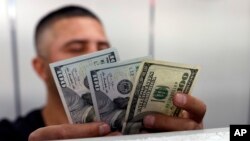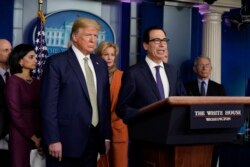The federal government is looking at quickly sending money directly to Americans to soften the economic blow from the coronavirus pandemic.
“I think we are going to do something that gets money as quickly as possible” to Americans, President Donald Trump told White House reporters on Tuesday.
“The president has instructed me we have to do this now,” Treasury Secretary Steven Mnuchin said alongside Trump on the briefing room podium. “We’re looking at sending checks to Americans immediately. And I mean now, in the next two weeks.”
Trump’s administration is seeking to get Congress to approve an infusion of as much as $850 billion into the economy, including $250 billion for small business loans, and $50 billion to bail out the country’s airlines, as part of an emergency stimulus package.
WATCH: Financial assistance for Americans
This would be in addition to another $100 billion-plus package passed by the House. That legislation provides paid sick leave, unemployment insurance and other benefits for workers affected by the national spread of COVID-19.
“We want to have a big infusion, as opposed to going through little meetings every couple of days,” Trump said about the request to Congress. “We’re going big, and that’s the way it’ll be.”
The Federal Reserve announced on Tuesday it is seeking to keep up to $1 trillion in credit flowing to businesses.
That announcement gave some encouragement to U.S. stock traders. The major averages rebounded after losing initial gains in Tuesday morning trading. The benchmark Dow Jones Industrial Average closed up, about 1,050 points — a gain of 5.2%.
On Monday, the Dow Jones Industrial Average experienced its worst rout since 1987’s "Black Monday."
“Everybody wants to keep it open,” said Mnuchin, responding to a question about stock market operations. “We may get to a point where we shorten the hours if that’s something they need to do.”
The president predicted that once the coronavirus is gone, the stock markets “will pop back up like nobody has seen.”
Investment bank Goldman Sachs forecast no U.S. economic growth for the first quarter of this year and an annualized rate contraction of 5% in the second quarter.
“I think most people now feel like we are headed towards a recession if not already in a recession, at least in the United States, if not globally,” Shaki Abbas, director of economic policy at the Bipartisan Policy Center, told VOA.
The White House on Monday recommended people in the United States avoid social gatherings of more than 10 people for at least the next 15 days.
Some of the latest attempts to prevent the virus from spreading included new shelter-in-place orders Tuesday for about 7 million people in the San Francisco area, as well as closures of movie theaters, gyms and restaurants in Washington, D.C.
Organizers of the Kentucky Derby horse race have announced the event is being postponed until September — the first time in 75 years the event will not occur on the first Saturday in May.
Professional basketball and hockey leagues have suspended their season, and Major League Baseball has postponed Opening Day.
During Tuesday’s briefing, Vice President Mike Pence appealed to construction companies to donate to hospitals their scarce N95 masks and not order new ones for now amid a shortage of equipment that could grow worse as virus patients overwhelm the medical system.
The United States has more than 6,400 coronavirus cases in all 50 states.
So far, at least 100 deaths have been reported from the disease in the country. Most of the fatalities are in the states of Washington and New York.
VOA's Patsy Widakuswara contributed to this report.








